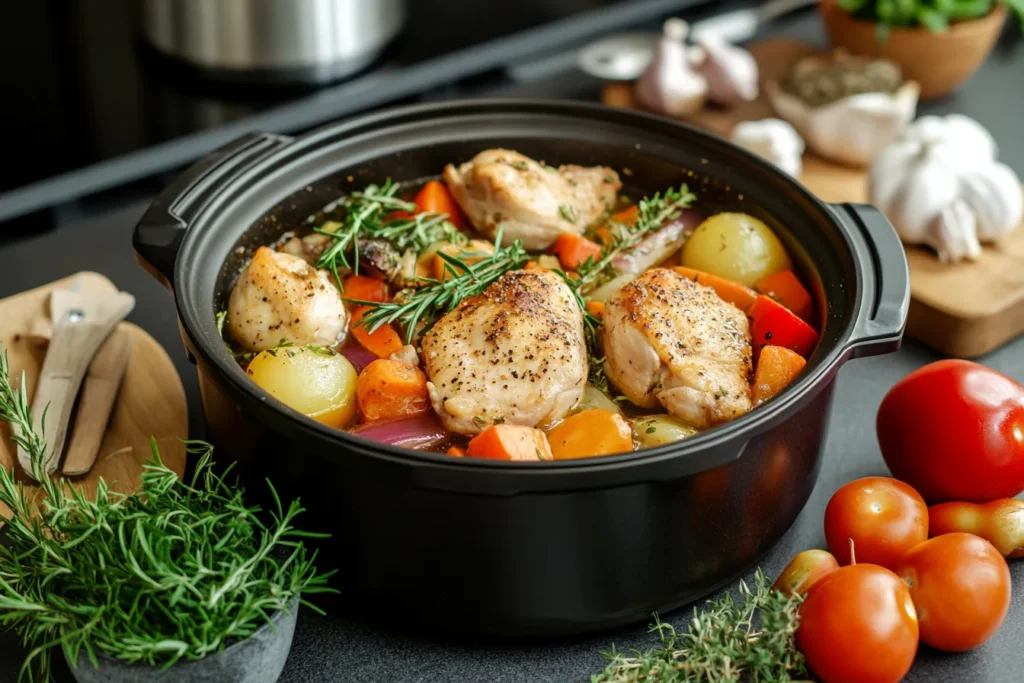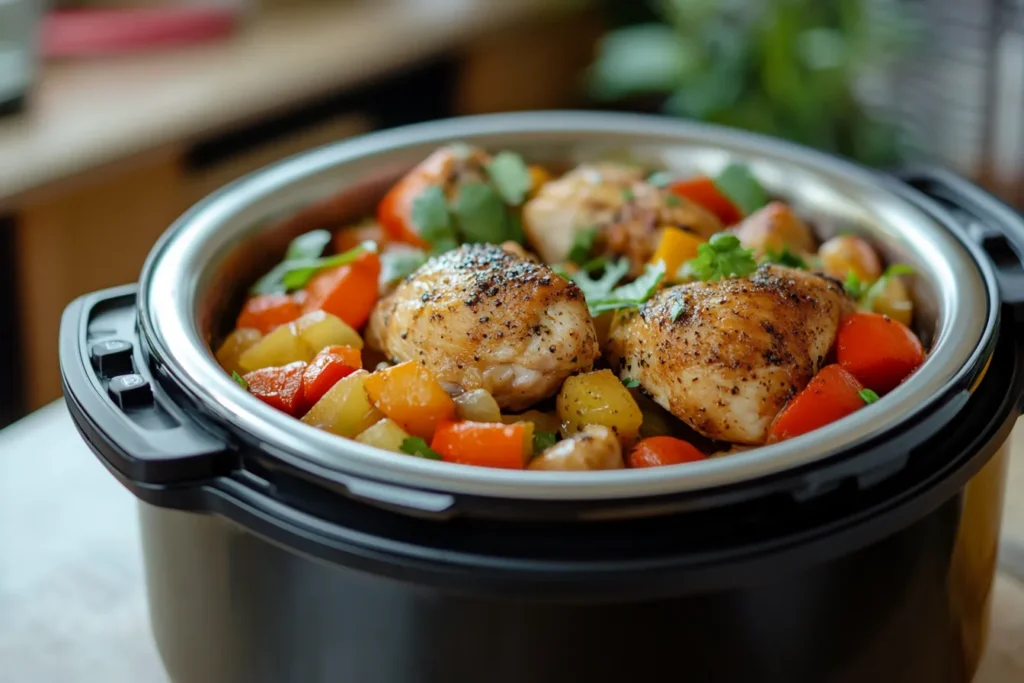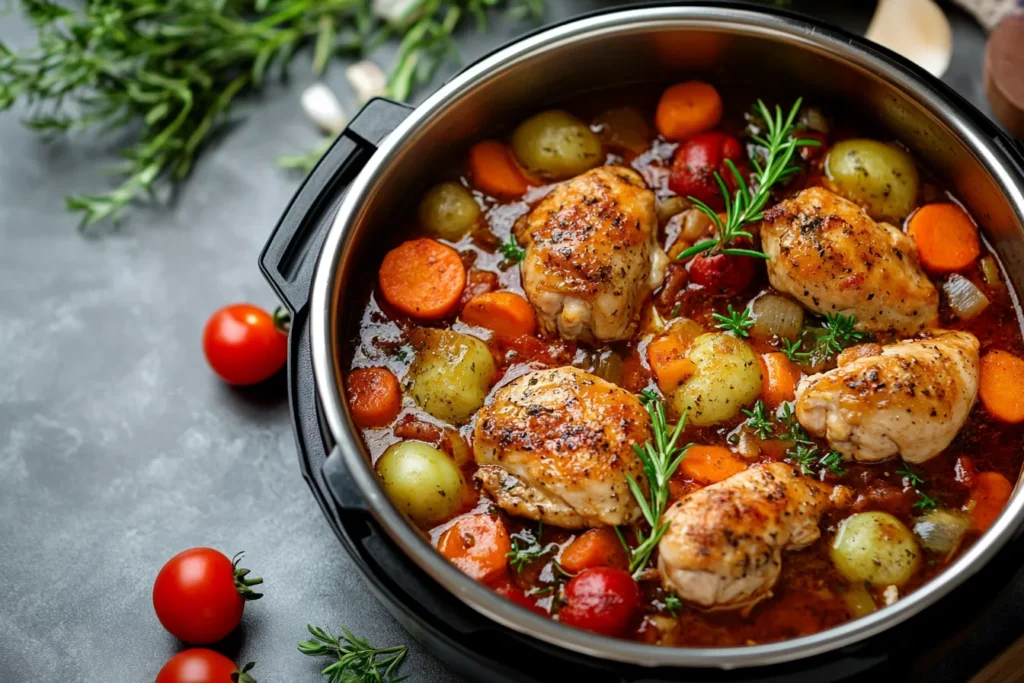Cooking has been revolutionized by the rise of the Instant Pot, a multifunctional device that can pressure cook, slow cook, sauté, and more. With busy lifestyles becoming the norm, many rely on this convenient kitchen gadget to whip up healthy Instant Pot meals quickly and efficiently.
But the question remains: Are Instant Pot meals healthy? This article explores how Instant Pot cooking affects nutrient retention, the health benefits of Instant Pot meals, potential concerns, and expert tips for making your Instant Pot meals even healthier.
By the end, you’ll have a clear answer to whether Instant Pot meals are truly healthy and how to maximize their nutritional value.
Table of Contents
Table of Contents

Understanding the Instant Pot
What Is an Instant Pot?
The Instant Pot is a modern-day kitchen marvel. It’s a programmable electric pressure cooker designed to simplify cooking. Whether you’re making soups, stews, or even desserts, this appliance has gained popularity for its versatility.
Instant Pots combine several cooking functions, including steaming, sautéing, slow cooking, and yogurt making. Compared to traditional stovetop pressure cookers, they are safer, easier to use, and more precise.
How It Differs From Traditional Cooking Methods
Unlike stovetop or oven cooking, the Instant Pot uses high-pressure steam, significantly reducing cooking times. For example:
- Rice cooks in just 10 minutes.
- Tough cuts of meat become tender in under 30 minutes.
- Vegetables retain their vibrant color and texture.
This unique approach raises questions about nutrient retention and overall meal health. Eating Well explores this topic, shedding light on how pressure cooking may actually preserve more nutrients than boiling or frying.
Nutrient Retention: Fact or Fiction?
When it comes to retaining nutrients, the Instant Pot often outshines other methods. Studies have shown that pressure cooking preserves water-soluble vitamins like Vitamin C and B-complex better than boiling or steaming. This is because the cooking time is shorter, and the closed environment minimizes nutrient loss.
Comparisons With Other Cooking Methods
- Boiling: Nutrients like Vitamin C often leach into the water.
- Microwaving: Can lead to uneven heating and loss of sensitive nutrients.
- Instant Pot: Retains nutrients due to reduced exposure to water and heat.
Cleveland Clinic highlights that while no cooking method is perfect, Instant Pot meals maintain a significant nutritional edge. Learn more about expert opinions on pressure cooking and nutrition here.
Are Instant Pot Meals Healthy for Nutrient Retention?
There are many reasons why cooking with the Instant Pot can contribute to a healthier diet:
- Lower Fat Content: Many recipes require little to no oil, reducing calorie intake.
- Retention of Vitamins and Minerals: The sealed environment locks in essential nutrients.
- Reduced Cooking Times: Shorter cooking minimizes heat exposure, preserving delicate compounds.
- Convenience for Whole Foods: The Instant Pot makes cooking whole grains, legumes, and fresh vegetables much easier.
Potential Health Concerns
While the Instant Pot offers plenty of benefits, it’s essential to consider potential downsides.
High-Temperature Cooking Risks
Some worry about the formation of harmful compounds like acrylamide when cooking at high temperatures. However, the Instant Pot’s controlled settings often mitigate these risks.
Material Safety
The Instant Pot’s stainless steel inner pot is generally safe, but users should avoid using scratched or damaged pots to prevent leaching of materials.
Overcooking Risks
Delicate vegetables like spinach and broccoli can lose texture and nutrients if overcooked. To avoid this, use the steam or quick-release functions and stick to recommended cooking times.
Tips for Healthy Instant Pot Cooking
Maximize the healthiness of your meals by following these tips:
- Use Fresh, Whole Ingredients: Avoid pre-packaged mixes or processed foods.
- Balance Macronutrients: Incorporate lean proteins, whole grains, and healthy fats.
- Limit Salt and Sugar: Opt for herbs and spices to enhance flavor without excess sodium or sugar.
- Cook in Batches: Meal prep allows for easy, nutritious meals throughout the week.
Healthy Instant Pot Recipes
Explore these wholesome recipes that showcase the Instant Pot’s versatility:
- Instant Pot Vegetable Soup
Packed with vitamins and fiber, this soup is perfect for a light yet satisfying meal. Check out this nutrient-packed recipe for inspiration. - Chicken and Barley Stew
A hearty dish combining lean protein and whole grains. - Low-Sodium Lentil Stew
High in protein and free from excessive salt. Try this low-sodium version.
Frequently Asked Questions
Does Pressure Cooking Destroy Nutrients?
No, Instant Pot meals often retain more nutrients than other cooking methods because pressure cooking uses less water and reduces overall cooking time. Studies show that healthy Instant Pot meals preserve water-soluble vitamins like Vitamin C and B-complex better than boiling or steaming.
Can I Cook Frozen Meat in the Instant Pot?
Yes, Instant Pot meals can be made using frozen meat. The Instant Pot is designed to cook frozen ingredients safely, though cooking times may be longer. To ensure healthy Instant Pot meals, always check internal temperatures before serving.
Are Instant Pot Meals Suitable for Meal Prep?
Absolutely! Healthy Instant Pot meals are perfect for meal prep. They can be stored for several days and reheated without losing quality. Meal prepping with an Instant Pot saves time while keeping meals fresh and nutritious.
How Do I Avoid Overcooking Vegetables in the Instant Pot?
To maintain the health benefits of Instant Pot meals, use the quick-release function and follow recommended cooking times for delicate vegetables. Overcooking can lead to nutrient loss, so opt for shorter cooking times to preserve texture and vitamins.

Conclusion
Are Instant Pot meals healthy? In short, yes—with proper usage. The Instant Pot offers a way to cook quickly, retain nutrients, and create balanced meals. By focusing on fresh ingredients and mindful cooking, you can enjoy all the benefits this versatile appliance has to offer.
For more wholesome ideas, don’t forget to explore recipes like Healthy Instant Pot Chicken and Quinoa.
Takeaway: The Instant Pot is not only a time-saver but also a valuable tool for cooking healthy, nutrient-rich meals. By making thoughtful choices and leveraging its capabilities, you can transform your diet with ease and efficiency.
